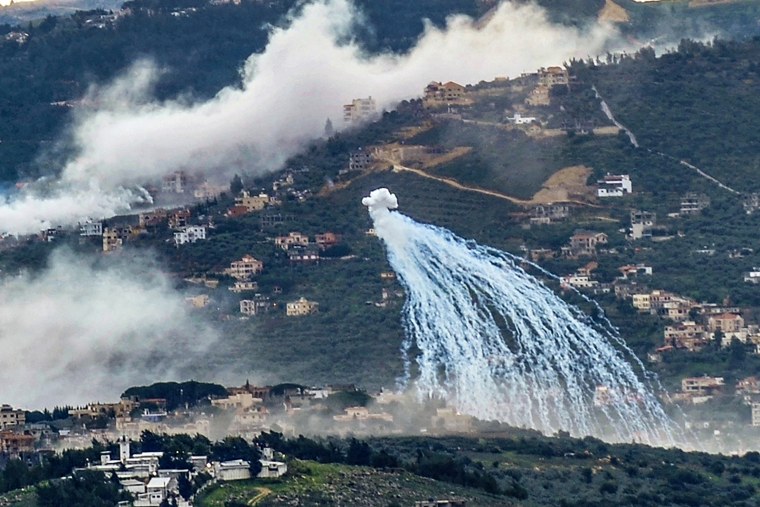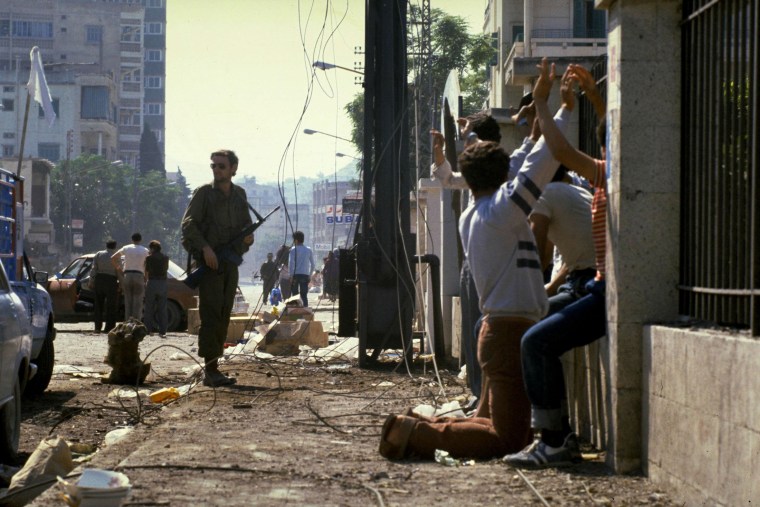Having failed to secure a cease-fire, President Joe Biden’s administration is signaling that it supports Israel’s operations against Iran-backed Hezbollah and the group’s eventual withdrawal from southern Lebanon.
The hope is that a weakened Hezbollah — Tehran’s most important proxy force and Lebanon’s most powerful political party — will provide an opening for the Lebanese to elect a new president and push the militants to the sidelines and away from the southern border with Israel for good.
“We do see Israel having the right to conduct these limited incursions to degrade Hezbollah’s capability,” State Department spokesperson Matthew Miller said at a briefing last week.
“We want to see these incursions be limited, and ultimately we want to get back to implementation of 1701, which means the government of Israel withdrawing back behind the border,” he added, referring to a United Nations resolution meant to end hostilities between Hezbollah and Israel with the creation of a buffer zone.
The refocused U.S. diplomatic effort faces challenges across many fronts, including finding a way to implement the decades-old U.N. resolution that was never fully enforced.
Adopted by the United Nations in 2006 after the last major war between Israel and Hezbollah, 1701 was designed to pave the way for a lasting peace.
With a goal of long-term security, the resolution would have Israeli forces fully withdraw from Lebanon, which would have had full sovereignty over its south. With Hezbollah excluded, the Lebanese army and thousands of peacekeepers from the United Nations Interim Force in Lebanon (UNIFIL) would have maintained an armed presence south of Lebanon’s Litani River.

Almost 20 years on, the militant group has amassed upward of 150,000 missiles and rockets, according to the CIA’s World Factbook, in addition to drones and anti-tank, anti-aircraft and anti-ship missiles. The country is also mired in political and economic crises, with a vacant presidency since 2022 causing a leadership vacuum, while hyperinflation and a collapsed currency have created widespread poverty.
Since Oct. 8, 2023, the day after Hamas launched its terror attacks on Israel, which officials in the country say killed 1,200 people and led to around 240 being taken hostage, Hezbollah has been firing rockets and other projectiles into northern Israel, in solidarity with the Palestinian militant group. Israel’s offensive in Gaza since then has killed more than 42,000 people, according to health officials in the enclave.
For months, as the pair traded tit-for-tat attacks, more than 60,000 people were displaced from their homes in northern Israel, according to government tallies — and Prime Minister Benjamin Netanyahu’s government cited this as the reason for launching its military campaign into southern Lebanon last month.
More than 2,000 people have been killed in Lebanon since the Oct. 7 attack and an estimated 1.2 million have been displaced, according to Lebanese officials. A large number of these left their homes after Israel began its widespread bombing on Sept. 17, when pagers belonging to members of Hezbollah exploded across the country.
The Biden administration shares Israel’s frustration that the UNIFIL peacekeeping mission did not prevent Hezbollah from hiding weapons in tunnels and homes along their border, according to a senior administration official.

Retired Navy Adm. James Stavridis, a former commander of NATO, pointed at UNIFIL’s failure to prevent Hezbollah from hiding weapons in tunnels and homes along the border.
“If the U.N. mission were doing its job and ensuring that there was a significant demilitarized zone just to the north of the Israeli border, up to the Litani River, Israel would not have had to invade and undertake the kind of military operations they are now,” he said.
“And frankly, this mission has been something that military analysts and observers like myself have been critical of for a decade or more. They just have not been effective at the task they were given.”
Now the Biden administration is hoping to bolster Lebanon’s political system by pushing a new presidential election and the strengthening of the Lebanese Armed Forces.
“The solution to this crisis is not a weaker Lebanon. It’s a strong and truly sovereign Lebanon, protected by a legitimate security force, embodied in the Lebanese Armed Forces,” U.S. Ambassador Robert Wood said in a meeting at the U.N. Security Council last week. “And so, the international community must focus its efforts accordingly: helping strengthen Lebanese state institutions, so that they can exercise effective control over Lebanon’s territory.”
For the past two years, Hezbollah has also blocked the election of a president who wasn’t allied with the group — a leadership vacuum that has hamstrung the passage of new legislation and much-needed economic reforms.
While it lost its majority in the 2022 election, Hezbollah and the factions that support it held onto 62 of the 128 seats in the Lebanese Parliament, retaining its status as a major player. Also, it remains the most important political outlet for the country’s Shia Muslims, one of its largest sectarian blocs.
Jeffrey Feltman, who served as U.S. ambassador to Lebanon from 2004 to 2008, said that a weakened Hezbollah could be beneficial to Lebanon, but he feared that Israel’s “limited, localized and targeted incursion will be anything but.”
“One hopes they don’t overreach in a way that will lead to Hezbollah 2.0,” he said in a call with NBC News on Monday.
Among the other risks Feltman cited are a passive Lebanese state that cannot meet the moment or a backlash from Hezbollah so severe that it leads to the destruction of the Lebanese state.
In a series of calls over the past few weeks, U.S. Secretary of State Antony Blinken has engaged his Arab and European counterparts, as well as Lebanon’s leaders, to rally support behind the diplomatic effort. But critics of the push have raised concerns about the U.S. attempting to influence Lebanon’s political future.
“We hope that the Lebanese political system can break that deadlock,” Miller said Friday. “And ultimately, we hope that Hezbollah is degraded enough that they are less of a force in Lebanese politics and that they agree to withdraw back up above the Litani River, so 1701 can be implemented.”

Inside Lebanon, the caretaker prime minister, Najib Mikati, said Friday that a swift presidential election was needed, but his country would be formally asking the U.N. Security Council for a resolution calling for an immediate cease-fire and Israeli withdrawal.
Such a resolution would be helpful, an Arab diplomat told NBC News, but cautioned that it was unlikely to weaken Hezbollah as long as it maintained the support of Iran.
Accusing Hezbollah and its Iranian backers of holding the government hostage, Lebanese member of Parliament Ghayath Yazbek said it would be impossible to apply Resolution 1701 unless the country’s army, and not Hezbollah, was in control.
“Unless Hezbollah is defeated in the war, or Hezbollah will have the wisdom to spare Lebanon and its people more destruction and martyrdom, and decides to stop the war, 1701 can’t be applied,” he said.
Kassem Kassir, a writer and political analyst, agrees that implementing 1701 and holding elections would be impossible at the moment, but blames the problem on Israel, the U.S. and their allies, not Hezbollah.
“What is required first is to stop the Israeli aggressions on Lebanon, and there is no possibility of negotiations about any political issue, whether local or international, before the aggression stops,” he said. “What is required before any negotiation is to stop the aggressions and to stop the strikes over the innocent civilians that are being killed.”

